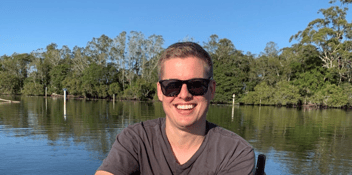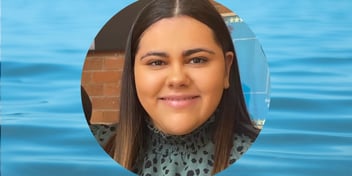Spotlight on a Regional YWP: Trevor Sultana and Brendan Dagg
Regional AWA members have always been important to delivering water and sewage services across the country. This Spotlight article is part of a series highlighting the experiences and contributions our regional members make to their industry and communities. In this interview we learn about two regional members - Trevor Sultana, who works for Goulburn Mulwaree Council and Brendan Dagg, who works for GHD in Newcastle. Trevor and Brendan are the Regional Representatives for the NSW YWP Committee. Together, they continue to champion initiatives and provide voices for regional YWPs.
Trevor Sultana
Q: Tell us a little about yourself and the work you do.
I am originally form Blacktown in Western Sydney and moved to Orange in 2015 to work for Cabonne Council working in assets. It was here I got a chance to experience working in the water and sewer industry. In 2017 I moved to Coonamble to take up a role as the Water and Sewer Operations Manager within the council. Then in 2019 I moved to Goulburn where I worked as the Infrasturcture and Development Engineer looking after Goulburn and Marulan’s water and sewer reticulation networks, as well as development with regards to water and sewer. Last year I began the role of Business Manager Water Operations. In my current role I manage the water and sewer systems for the council, managing 16 staff members, including a graduate engineer and trainee water treatment plant operator. The water and sewer networks service a population of approximately 25,000 people, and my role also includes managing key aspects such as trade waste, operation and maintenance programs and capital works projects such as the new treatment plants to be built in Marulan.
Q: What brought you to work at Goulburn?
I was in the middle of completing a leadership program at Coonamble and through the program decided I wanted to develop further as a leader, gain experience in a larger council system and get closer to family and friends in Sydney. This led to my move to Goulburn.
Q: What is the best thing about working in a regional area?
There are a number of great things that come from working in a regional area including a shorter commute to and from work and having a relaxed and laid back lifestyle. I also find working in a regional office, the vibe or work environment is more casual, with everyone willing to work hard without taking things too seriously. I find working in a smaller utility also allows for exposure to more areas of the business and provides a more well-rounded professional experience, and there are often more opportunities for career progression.
Q: What is the most difficult thing about working in a regional area?
Access to resources and expertise, including qualified staff to hire locally which leads to generally training of the staff who we hire.
Q: What moment/achievement are you most proud of in your professional career?
There’s no single moment in my career that sticks out, rather a lot of small steps which lead to great progress. When I was at Coonamble I hired a young trainee who was keen to get a safe and secure job for his family. He did so after I left, but I found out he successfully completed his traineeship and found a job as an operator at another Council. I also implemented a mobile phone app at Coonamble which allowed myself and the operators to better record reactive maintenance on the water and sewer assets, which helped to inform the asset management systems. I also count the opportunity to attain leadership positions and complete leadership programs at a young age as something I’m proud of, as well as sharing my experiences and helping others reach their goals.
I think a professional career is like hiking up a mountain – there’s no single step that you remember about the journey, but it is always nice to look back and admire how far you’ve come and how far there is left to go.
Q: If you could go back five years, what advice would you give yourself?
You will learn soon enough that every journey is a lot easier when you have people walking with you, it’s much easier than trying to drag people along with you
Brendan Dagg
Q: Tell us a little about yourself and the work you do.
I was born in Singleton, about 70km inland from Newcastle in the Hunter coalfields. I always expected to work in the mining industry given it has always been so prominent in the region, and within my upbringing. I certainly didn’t expect I’d end up in the water industry but am glad to have found my way into this specialisation because it allows me to work on a range of challenging projects which have a sustainable impact on our environment.
While completing a chemical engineering degree at the University of Newcastle I was lucky enough to do a placement at Glencore and at the AGL Bayswater and Liddell power stations. These experiences gave me my first practical insight and fuelled my interest in working with large processes.
At the end of my third year of engineering, I attained a work placement with GHD which continued until I finished my degree in 2019, where I joined the GHD Graduate Program which exposed me to a large variety of projects, process design and modelling. Initially my work focused on design and construction of wastewater treatment plants but over the years this experience has expanded into desalination, recycled water, water treatment and industrial water treatment across all phases of the design process from feasibility to construction.
Q: What brought you to work at Newcastle?
I grew up in Singleton and lived there most of my life so I’m familiar with the Hunter region. I spent the first 12 months at GHD driving to and from Singleton to the office in Newcastle, but after a while decided to move to Lake Macquarie. This was closer to work but also offered a great coastal lifestyle and is close to my partner’s family, university friends and it’s still an easy drive to visit my family and friends in Singleton.
Q: What is the best thing about working in a regional area?
I find the contrast in lifestyle appealing. Newcastle has the metro ‘vibe’ without the hustle and bustle of a large capital city like Sydney. There is a relaxed lifestyle, while still having the ‘luxuries’ at arm’s reach. It also doesn’t take long to travel to Sydney or drive out and explore the smaller towns and wineries in the region.
Q: What is the most difficult thing about working in a regional area?
The typical or expected difficulties with working remotely have largely reduced due to the pandemic. Everyone has been forced to work remotely and from home, so the interconnectivity between businesses has improved and effectively reduced the issues associated with distance. Despite the constraints of the pandemic, we have still been able to deliver multi-disciplinary projects including design and construction with team members across different locations around the globe.
Q: What moment/achievement are you most proud of in your professional career?
I’ve recently completed an options assessment for a wastewater treatment plant upgrade in the Pacific region, which was hugely satisfying. Having the opportunity to help make a difference in a developing country is something that is so fulfilling and something I want to continue to achieve in my career. I’ve also been able to complete and contribute to so many projects in regional NSW, and it is a great feeling to be able to drive past something and say, ‘I helped design that’.
Q: If you could go back five years, what advice would you give yourself?
Enjoy university life more. Socialise more and stress less – everything will work itself out. Also, if the opportunity sounds interesting, say yes first because if you really want to do it, you will work out the details later.
Regional YWP’s are making a difference in their local areas and the industry as a whole. If you are a YWP living, working, or studying in a regional area in New South Wales and would like to get involved or share your story, please contact your YWP Committee Regional Representatives:
Trevor Sultana | Trevor.Sultana@outlook.com
Brendan Dagg | Brendan.Dagg@ghd.com


